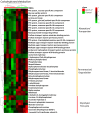The artificial sweetener acesulfame potassium affects the gut microbiome and body weight gain in CD-1 mice
- PMID: 28594855
- PMCID: PMC5464538
- DOI: 10.1371/journal.pone.0178426
The artificial sweetener acesulfame potassium affects the gut microbiome and body weight gain in CD-1 mice
Abstract
Artificial sweeteners have been widely used in the modern diet, and their observed effects on human health have been inconsistent, with both beneficial and adverse outcomes reported. Obesity and type 2 diabetes have dramatically increased in the U.S. and other countries over the last two decades. Numerous studies have indicated an important role of the gut microbiome in body weight control and glucose metabolism and regulation. Interestingly, the artificial sweetener saccharin could alter gut microbiota and induce glucose intolerance, raising questions about the contribution of artificial sweeteners to the global epidemic of obesity and diabetes. Acesulfame-potassium (Ace-K), a FDA-approved artificial sweetener, is commonly used, but its toxicity data reported to date are considered inadequate. In particular, the functional impact of Ace-K on the gut microbiome is largely unknown. In this study, we explored the effects of Ace-K on the gut microbiome and the changes in fecal metabolic profiles using 16S rRNA sequencing and gas chromatography-mass spectrometry (GC-MS) metabolomics. We found that Ace-K consumption perturbed the gut microbiome of CD-1 mice after a 4-week treatment. The observed body weight gain, shifts in the gut bacterial community composition, enrichment of functional bacterial genes related to energy metabolism, and fecal metabolomic changes were highly gender-specific, with differential effects observed for males and females. In particular, ace-K increased body weight gain of male but not female mice. Collectively, our results may provide a novel understanding of the interaction between artificial sweeteners and the gut microbiome, as well as the potential role of this interaction in the development of obesity and the associated chronic inflammation.
Conflict of interest statement
Figures






References
-
- Gardner C, Wylie-Rosett J, Gidding SS, Steffen LM, Johnson RK, Reader D, et al. Nonnutritive sweeteners: current use and health perspectives a scientific statement from the American heart association and the American diabetes association. Diabetes Care. 2012;35(8):1798–808. 10.2337/dc12-9002 - DOI - PMC - PubMed
MeSH terms
Substances
Grants and funding
LinkOut - more resources
Full Text Sources
Other Literature Sources
Medical
Miscellaneous

